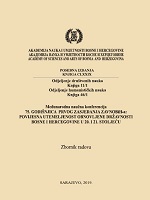KONCEPT LJUDSKIH PRAVA I SLOBODA IZ DEKLARACIJE ZAVNOBIH-A O PRAVIMA GRAĐANA U KONTEKSTU KORPUSA LJUDSKIH PRAVA I SLOBODA IZ EVROPSKE KONVENCIJE ZA ZAŠTITU LJUDSKIH PRAVA I OSNOVNIH SLOBODA I ULOGE USTAVNOG SUDA BIH U DOPRINOSU VLADAVINI PRAVA I...
CONCEPT OF HUMAN RIGHTS AND FREEDOMS FROM THE DECLARATION OF THE MEETING OF ANTI FASCHIST PEOPLES LIBERATION OF BIH (ZAVNOBIH) ON THE RIGHTS OF CITIZENS IN THE CONTEXT OF HUMAN RIGHTS AND FREEDOMS CORPUS FROM THE EUROPEAN CONVENTION FOR THE...
Author(s): Miodrag N. Simović, Milena Simović
Subject(s): History of Law, Constitutional Law, International Law, Human Rights and Humanitarian Law, Recent History (1900 till today)
Published by: Akademija Nauka i Umjetnosti Bosne i Hercegovine
Keywords: Bosnia and Herzegovina; Constitution of Bosnia and Herzegovina; Constitutional Court of Bosnia and Herzegovina; European Convention for the Protection of Human Rights and Fundamental Freedoms;
Summary/Abstract: Declaration on Rights of Citizens of BIH, established at the Second Meeting of ZAVNOBIH in 1944, guarantees equality of Serbs, Muslims and Croats in BIH, which is their common and indivisible homeland, freedom of religion and conscious, freedom of speech and agreement, association and press, personal and property safety of citizens, freedom of private initiative in economic life and equality of woman and man. This is the first documents of modern times which guarantees human rights regardless of their religion, nationality and gender. In Sanski Most, during the war in 1944, rights of citizens of BIH have been defined which have been in essence the same as human rights established four years later under Universal Declaration on Human Rights, adopted at the General Assembly of United Nations on 10 December 1948 and six years later under European Convention for the Protection of Human Rights and Fundamental Freedoms, adopted on 4 November 1950 in Rome. Authors point out that many elements of international law and standards from the scope of human rights and fundamental freedoms have been integrated into legal systems of Bosnia and Herzegovina. The Paper points out that numerous elements of international law and standards from the scope of human rights and fundamental freedoms have been integrated into the legal system of Bosnia and Herzegovina. Attention is also focused on Article II of the Constitution of Bosnia and Herzegovina, which guarantees the widest catalog of human rights and fundamental freedoms, and Article II/3 of this Constitution which establishes that Bosnia and Herzegovina shall directly apply the rights and freedoms enshrined in the European Convention for the Protection of Human Rights and Fundamental Freedoms, as well as its Protocols. The starting point is that these acts have priority over all other laws. In addition, Article II of the Constitution of BIH contains a list of guaranteed rights, with special provisions on the prohibition of discrimination, the protection of the rights of refugees and displaced persons, and the protection of rights from the 15 international human rights treaties listed in Annex I to the Constitution of BIH applicable in BIH. Also, Article X, paragraph 2 of the Constitution of BIH provides that no change or amendment to this Constitution may either abolish or diminish any of the rights and freedoms set out in Article II of the Constitution or amend paragraph 2 of Article X. The Constitutional Court of Bosnia and Herzegovina has an important and irreplaceable role in the protection of human rights and fundamental freedoms guaranteed under the Constitution of BIH. It has a special place in the constitutional system of BIH. The Constitutional Court is a constitutional body, regulated under Article VI of the Constitution of BIH. Under this Constitution, the Constitutional Court is separated from the system of triple separation of power. So, it is not a part of the legislative, executive and regular judicial authorities. It is the highest constitutional body of BIH, which guarantees the respect and application of the Constitution of BIH. In short, it is the guardian of the Constitution of BIH. In national framework, the Constitutional Court is also the supreme mechanism for the protection of rights under the European Convention for the Protection of Human Rights and Fundamental Freedoms, given its direct incorporation into the Constitution of BIH and the rights and freedoms provided by international agreements applicable in BIH.
- Page Range: 463-491
- Page Count: 29
- Publication Year: 2019
- Language: Serbian
- Content File-PDF

